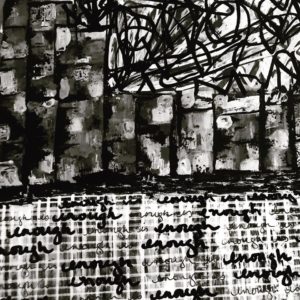Okay folks. This isn’t an easy blog post to write. I’m going to be honest about my failings as a white woman in America when it comes to issues of bigotry and racism.
I was inspired to write in part by this awesome painting by my daughter, Anjanette. She created this a couple of days after the murder of George Floyd, and it has such a powerful statement.

When I saw the photo of the painting on Facebook, I cried. Just like I cried the day I saw the video of George Floyd being murdered by cops in Minneapolis. I cried, as I have almost every day since, when I see pictures and videos of the chaos and violence in so many cities across the country.
But let me go back to the beginning of my journey toward those tears.
In July 1967, I lived in Detroit and clearly recall every day and every hour of the race riots there. I remember my husband slept downstairs for three days with the shotgun at his side after we heard that people were coming to the Tank Arsenal and the General Motors complex next to it. Both were frightfully close to the apartment complex where we lived.
I will be honest and admit I really didn’t understand why people were rioting. Even though I’d been active in Civil Rights efforts a few years prior, life issues had pulled me away from finding out any more about the disparity between the way I lived my life and the way black people lived their lives.
Sure, we had a shared history of poverty, and I experienced some discrimination because of where I’d lived when I was growing up. It was a poor neighborhood, but all white. And, as a good friend pointed out many years after 1967 while holding her brown arm next to mine, “Nobody will ever know about the discrimination of your past. Mine is indelibly marked in the color of my skin.”
Still, it took the passage of many more years and lots of reading about the black experience and racism and bigotry to gain even a smidgen of an understanding of the depth of the problems in our society. A society that has been dominated and controlled by white Americans who have stepped on the backs of black Americans to keep them down.
I even had the audacity to write a book about bigotry Coping with a Bigoted Parent, which is thankfully out of print. I say “thankfully” because I didn’t know shit about the topic back then. And I really thought we’d solved the major issues of racism with changes that came out of the Civil Rights Movement. But we didn’t do enough. Not nearly enough.
More recently, I’ve listened to podcasts like Throughline and Code Switch that often tackle topics of racism, offering the listener a different perspective – that of a person of color. And I’ve watched videos on YouTube, like ones from LeRon L. Barton, and really see some of what has brought us to this point of cities burning.
It’s the pent-up anger, exhaustion, and fear experienced by black, brown, and indigenous people facing structural racism and systemic disparities between the way white and black people are treated.
A common term to describe those differences is White Privilege.
In September 2017, Lori Lakin Hutcherson, Editor in Chief of Good Black News responded to a friend who was asking for clarification of what White Privilege means. Jason, a white man, was confused about the concept, never having it pointed out to him in specifics. So, Lori did that pointing in a terrific article that was originally published in Good Black News and was reprinted later in Yes Magazine. Here are just a few of her answers to Jason:
White Privilege is being able to move into a “nice” neighborhood and be accepted not harassed, made to feel unwelcome, or prone to acts of vandalism and hostility.
If you’ve never had a defining moment in your childhood or your life where you realize your skin color alone makes other people hate you, you have White Privilege.
If you’ve never been on the receiving end of the assumption that when you’ve achieved something it’s only because it was taken away from a white person who “deserved it,” you have White Privilege.
If no one has ever questioned your intellectual capabilities or attendance at an elite institution based solely on your skin color, you have White Privilege.
[inlinetweet prefix=”” tweeter=”” suffix=””]What this past week of listening, of reading, of really paying attention to the messages of black people has taught me is that White Privilege is having the luxury of going to bed and forgetting about the problems of being black.[/inlinetweet]
Instead of forgetting, I’m going to remember what has happened in recent days and find one way that one old lady can make a difference. Enough is Enough and Black Lives Matter need to be more than just a hashtag.
Have your thoughts about racism changed in light of the murder of George Floyd and the subsequent protests and riots?
